News and Announcements
from Research & Economic Development
Dr. Melissa Morris Appointed as Director of Humanities Institute at UW
June 11, 2025
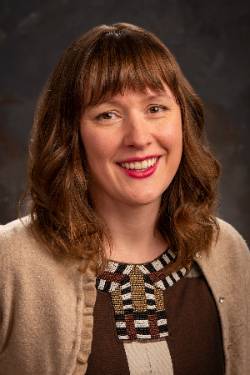
University of Wyoming history assistant professor, author and Fulbright scholar Dr. Melissa Morris has been appointed the next director of the Wyoming Institute for Humanities Research (WIHR) at UW.
WIHR promotes, supports and showcases humanities scholarship at UW and throughout the state and world. The institute supports individual and collaborative research projects of UW faculty, students and staff as an engine that fosters interdisciplinary research in the humanities. Morris’s appointment was the culmination of an extensive review and planning process that began in late 2024. At that time, UW’s College of Arts and Sciences organized a highly successful humanities summit; WIHR then conducted a five-year review of its activities and accomplishments. A review committee made up of internal and external distinguished researchers in humanities summarized the review in a report.
See the full story on UW News.
UW Kinesiology and Health Graduate Student Receives National Research Award
May 22, 2025
University of Wyoming Division of Kinesiology and Health graduate student Ashlyn Brown, from Castle Pines, Colo., is the recipient of the Thomas McKenzie Research Award from the Society of Health and Physical Educators (SHAPE) America.
Brown recently received the prestigious national honor at the SHAPE America convention in Baltimore, Md. Along with the monetary portion of the award, which will support completion of her master’s thesis, the highly competitive recognition will have a significant national impact on the field of physical education.
Brown’s thesis involves a secondary analysis of data from the U.S. Physical Education and Physical Activity Policy (US-PEPAP) Interactive Dashboard, a national project led by Ben Kern, Brown’s educational adviser and an associate professor in kinesiology and health, and the US-PEPAP research team.
Read the full story at UW News.
UW Researchers Publish Article Exploring Mowry Shale Geomechanics
May 14, 2025
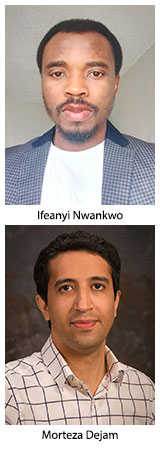
University of Wyoming researchers have published a critical review of the relationship among pore architecture, geomechanics and fluid flow during production-induced pressure decline in shales. This examination is a necessary step in identifying the factors that need special attention in researching burgeoning oil and gas reservoirs in Wyoming, such as the Mowry Shale.
The study, led by doctoral student Ifeanyi Nwankwo, examined the complexities of fluid movement through shale and the rock deformation and offered a path forward for research. Nwankwo, originally from Ifitedunu, Nigeria, is in the Department of Energy and Petroleum Engineering in the UW College of Engineering and Physical Sciences.
The article, titled “A critical review of experimental and theoretical studies on shale geomechanical and deformation properties, fluid flow behavior, and coupled flow and geomechanics effects during production,” was published in the International Journal of Coal Geology.
Co-authors include Morteza Dejam, an associate professor in the Department of Energy and Petroleum Engineering, and Scott Quillinan, senior director of research in UW’s School of Energy Resources (SER).
Read the full story at UW News.
UW Kicks Off Innovative Student-Run Venture Capital Program
May 14, 2025
A course on entrepreneurial finance at the University of Wyoming is enabling business students to have a hands-on role in the investment of funds from the UW Venture Capital Program.
Students enrolled in UW’s College of Business evaluate proposals from real-world startups in Wyoming in need of seed-level funding to take their companies to the next level. The program is a cooperative effort among the College of Business, the UW Foundation and UW’s Center for Entrepreneurship and Innovation (CEI).
“There’s a funding gap between the startup phase of a company and when it becomes suitable for institutional capital from a large venture capital firm,” CEI Director Robert Macy says. “We aim to fill that gap.”
The program is generously funded by the Fisher Incentive Funds in Entrepreneurship, an endowment established in 2017 by Donne and Sue Fisher. The Fisher funds are aimed at creating a lasting legacy by empowering students through real-world entrepreneurial experiences.
Read the full story at UW News.
UW Master Craftsman Program Expands Career Opportunities for UW Art Students
May 09, 2025
The University of Wyoming’s Center for Entrepreneurship and Innovation (CEI) is undertaking a program geared to give art students real-world experience in fabrication and restoration to help secure careers in manufacturing and design. The program will be offered as an extra-curricular course in the 2026 academic year.
UW art sculpture professor Ashley Hope Carlisle oversees the Master Craftsman Program.
Her approach to teaching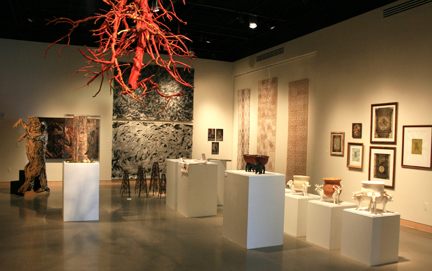 creative problem-solving through art is the driving concept behind the initiative.
The aim is to give learners direct exposure to business practices in industry, enabling
them to pursue professions in production, development, and construction.
creative problem-solving through art is the driving concept behind the initiative.
The aim is to give learners direct exposure to business practices in industry, enabling
them to pursue professions in production, development, and construction.
“This is a uniquely innovative approach that enables budding professionals in art disciplines to participate in a variety of industries as well as start their own artisan businesses,” said Robert Macy, Director of UW’s Center for Entrepreneurship and Innovation (CEI). “Students gain hands-on experience they can apply across a wide range of industries and career opportunities.”
Read the full story at UW News.
Sweetwater Carbon Storage Hub Project Completes First Deep Characterization Well
May 05, 2025
A significant carbon management project led by Frontier Carbon Solutions LLC (Frontier) -- in partnership with the University of Wyoming School of Energy Resources (SER) -- has completed the drilling of a deep characterization well. Drilling on a second well will begin as part of an effort to explore potential permanent carbon storage in southwest Wyoming.
Frontier’s project, the Sweetwater Carbon Storage Hub (SCS Hub), is the beneficiary of a grant from the Office of Fossil Energy and Carbon Management’s Carbon Storage Assurance Enterprise (CarbonSAFE) Initiative funded through the U.S. Department of Energy (DOE).
Alongside grant support from DOE and the Wyoming Energy Authority, Frontier is developing the SCS Hub to be a permanent carbon management solution to serve Wyoming’s critical hydrocarbon and mining industries, including trona mining operations and natural gas processing.
Read the full story at UW News.
UW-Led Initiative Helps Map World’s Largest Land Mammal Migration
May 1, 2025
New maps released this week document the world’s largest land mammal migration, revealing the seasonal journeys of more than 5 million white-eared kob and tiang antelope across South Sudan and Ethiopia.The work was made possible by the Global Initiative on Ungulate Migration (GIUM), a partnership of international researchers headquartered at the University of Wyoming that is producing detailed maps to guide conservation and infrastructure planning to protect ungulate migrations worldwide.
“The Great Nile Migration is one of Earth’s most extraordinary wildlife spectacles, even larger in numbers and spatial extent than the wildebeest migration of the Serengeti,” says Matthew Kauffman, a leading science adviser to GIUM and a professor of wildlife biology at the U.S. Geological Survey’s Wyoming Cooperative Fish and Wildlife Research Unit based at UW.
The maps were informed by animal tracking data collected by African Parks and the Ethiopian Wildlife Conservation Authority. They depict, in unprecedented detail, the expansive “Great Nile Migration,” one of the last remaining large-scale land migrations on Earth.
All told, biologists estimate the migrations include approximately 5 million to 7 million animals across four species -- white-eared kob, tiang, Mongalla gazelle and Bohor reedbuck.
Read the full story at UW News.
UW and USGS Discover Relationship Between Basaltic and Rhyolitic Eruptions
April 25, 2025
Kenneth Sims and other research scientists recently discovered that mafic volcanism
of Henrys Fork Caldera, which is located in eastern Idaho and west of Yellowstone
National Park, occurred concurrently with second- and third-cycle rhyolite volcanism
in and around the Yellowstone caldera.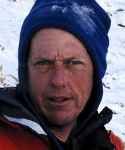
The revelation, detailed in a recently published paper, helps provide a new and younger timeline of volcanic activity in the Henrys Fork Caldera region and adds knowledge to the chronology of mafic eruptions and their temporal relation to rhyolitic volcanism in the Yellowstone Plateau volcanic field, of which little was previously known.
“Essentially, it changes our understanding of the Yellowstone magmatic system by showing how basaltic eruptions have ‘thermally primed’ Yellowstone's big caldera-forming eruptions and shows that there are some very young eruptions in the Henrys Fork Caldera,” says Sims, a University of Wyoming professor of geology and geophysics and a member of the United States Geological Survey (USGS) Yellowstone Volcano Observatory.
Read the full story at UW News.
UW Scientist Leads Research On How Responsible Logging Can Help Eastern U.S. Forests
April 22, 2025
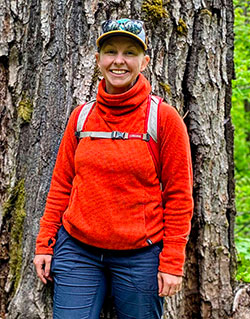 Responsible harvesting and other small disturbances can help make forests in the eastern
United States more resilient to climate change, according to research by a new University
of Wyoming faculty member.
Responsible harvesting and other small disturbances can help make forests in the eastern
United States more resilient to climate change, according to research by a new University
of Wyoming faculty member.
The study by scientists at Cary Institute of Ecosystem Studies is led by UW Botany professor Dr. Sara Germain. Dr. Germain completed the research as a Cary postdoctoral associate and recently joined UW’s Department of Botany. The study explores how Eastern U.S. forests are responding to climate change, how disturbances such as harvesting and pests can help or hinder climate adaptation, and what it means for carbon storage. The study was published in the journal Ecosystems in January. Eastern trees are becoming increasingly stressed by warming temperatures, which can slow their growth and reproduction.
“It was comforting to learn that Eastern forests, which hold the most carbon in the U.S., are actually doing OK,” Germain says. “With moderate, status quo levels of disturbance, Eastern forests have the capacity to remain an important carbon sink.”
Read the full story at UW News.
UW is One of Top 100 U.S. Universities With Most Patents
April 17, 2025
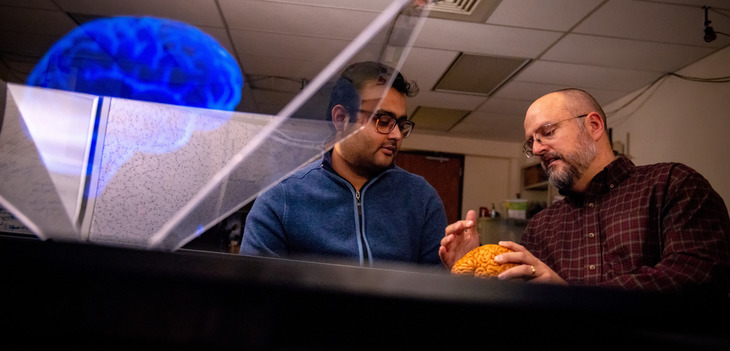 UW has once again made the list of the National Academy of Inventors’ (NAI) top 100
universities in the U.S. with the most patents granted. NAI placed UW at No. 91 on
its recently-published 2024 “Top 100 U.S. Universities Granted U.S. Utility Patents”
list. UW was 91st as well on NAI’s 2022 list. UW’s latest inclusion on the prestigious
top 100 list comes shortly after UW was designated an R1 (Research Level 1) institution
by the Carnegie Classification of Institutions of Higher Education in March, joining
the best of the best research universities in the country.
UW has once again made the list of the National Academy of Inventors’ (NAI) top 100
universities in the U.S. with the most patents granted. NAI placed UW at No. 91 on
its recently-published 2024 “Top 100 U.S. Universities Granted U.S. Utility Patents”
list. UW was 91st as well on NAI’s 2022 list. UW’s latest inclusion on the prestigious
top 100 list comes shortly after UW was designated an R1 (Research Level 1) institution
by the Carnegie Classification of Institutions of Higher Education in March, joining
the best of the best research universities in the country.
“UW’s patent output is a key driver of innovation, leading to startup companies, corporate engagement and job creation for Wyomingites," says Parag Chitnis, UW’s vice president for research and economic development. “This recognition continues to enhance UW’s reputation as a world-class research institution. Its inclusion in the NAI’s Top 100 is particularly remarkable, considering its small size.”
Read the full story at UW News.
UW-Led Study: Fences, Roads Foiled Pronghorn in Mass Winter Die-Off
April 04, 2025
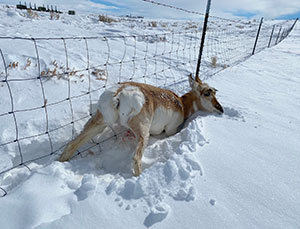 When a severe winter struck Wyoming’s Red Desert in December 2022, one pronghorn doe
made a desperate escape attempt, trudging 240 miles through a snowbound wasteland.
When a severe winter struck Wyoming’s Red Desert in December 2022, one pronghorn doe
made a desperate escape attempt, trudging 240 miles through a snowbound wasteland.
Fences blocked her routes to less snowy habitat, foiling her ability to run out of the deep snow and adding time and risk of her search. Ultimately, she returned to the area she started from, where she died.
Normally, pronghorn can cover many miles a day at speeds up to 60 mph. In an open landscape, they could easily move out of harm’s way, using survival strategies that have been successful since the Pleistocene.
This time, however, the worst winter in two decades combined with fence and road barriers, leaving the swiftest mammals on the continent with no way out. Pronghorn tried to make escape movements to find more hospitable habitats. By the end of the winter, half of the pronghorn had died in a stronghold of their range.
Read the full story at UW News.
UW Researchers Capture Birds by Day, While STRI Catches Bats by Night
April 04, 2025
For decades, Corey Tarwater and her research team have used mist nets by day to capture various species of tropical birds in Panama to study the effects of global change on bird populations. Now, the University of Wyoming researcher is starting a new collaboration with the Smithsonian Tropical Research Institute (STRI) to use the same mist net lanes to catch bats by night.
“We are really excited to collaborate with the bat team on this project. By working with them, we can figure out whether or not bats are responding the same way to climate that we’re seeing with the birds,” says Tarwater, a UW associate professor in the Department of Zoology and Physiology and the Robert B. Berry Distinguished Chair in Ecology, in an STRI story.
Read the full story at UW News.
UW Holds Forum to Catalyze NSF ART Program Efforts
March 06, 2025
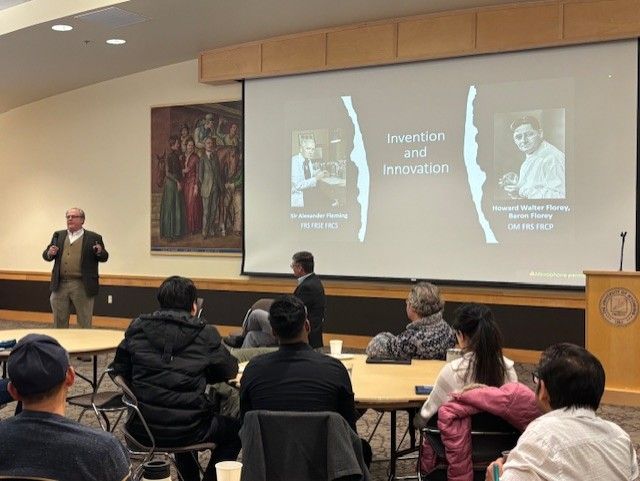 The University of Wyoming recently took an important step in its efforts to bolster
a culture of innovation and translational research among its research faculty and
postdoctoral fellows to translate their research into practical and economically beneficial
solutions that contribute to the growth of Wyoming’s economy.
The University of Wyoming recently took an important step in its efforts to bolster
a culture of innovation and translational research among its research faculty and
postdoctoral fellows to translate their research into practical and economically beneficial
solutions that contribute to the growth of Wyoming’s economy.
UW’s Technology Transfer Office hosted a two-day event called the National Science Foundation (NSF) ART Ambassador Forum last month to educate and inform more than 40 ambassadors who are volunteers from within and beyond the campus. These ambassadors are tasked with building and sustaining awareness of ways to maximize potential of UW research for outcomes that benefit local, regional and statewide communities of Wyoming.
ART, which stands for “Accelerated Research Translation,” is a relatively new NSF funding program designed to support research institutions such as UW that seek to broaden and improve their ability to make academic research beneficial to the public.
UW Ascends to Highest Level of Research Universities
February 13, 2025
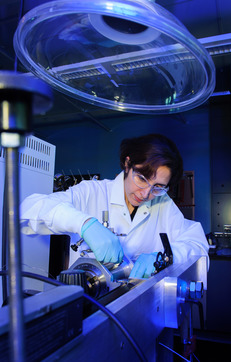 The University of Wyoming has reached the highest level of American research universities,
reflecting the university’s broad impact and evolution into a world-class hub for
research, innovation, entrepreneurship and public scholarship.
The University of Wyoming has reached the highest level of American research universities,
reflecting the university’s broad impact and evolution into a world-class hub for
research, innovation, entrepreneurship and public scholarship.
UW is one of 187 institutions nationwide designated as an R1 university by the American Council on Education and the Carnegie Foundation for the Advancement of Teaching. Today’s (Thursday) announcement puts UW in the top tier of U.S. research universities, as just 4.8 percent of the nation’s nearly 4,000 accredited, degree-granting institutions have reached this “very high research activity” category.
“Achieving Carnegie R1 status increases the value of a UW degree; serves as an impressive recruiting tool for faculty, staff and students; enhances our ability to boost the state’s economy; enriches the student experience through research opportunities; and builds on the already extraordinary sense of pride among members of the UW community,” UW President Ed Seidel says. “Getting to this point has taken years of effort. I’m delighted we have achieved this milestone, and we will keep working hard to enhance our value to students and the state of Wyoming.”
Through strategic investments in the last few years, such as the formation of the UW Graduate School and new programs to support research, UW has been supporting faculty members and students to foster its research enterprise. The university now stands at $166 million annually in research expenditures, an increase of 78 percent since 2021, ranking UW 42nd among the 318 public universities without a medical school.
Additionally, Carnegie R1 status is a measure of a university’s scholarly production. UW regularly produces close to 100 Ph.D. graduates each year.
UW Celebrates Research and Innovation Achievements
January 29, 2025
In late January the University of Wyoming awarded and honored the research and innovation of several members of its faculty in celebration of the impact, relevance and importance of their respective work.
UW’s annual Celebration of Excellence in Research and Innovation awards event, which was held at the Marian H. Rochelle Gateway Center, featured distinguished researcher, innovator and research service awards to three faculty members. An award also featured a standout UW school for demonstrating exemplary research culture.
The event designated several faculty members as honorees for research and innovation excellence, and recognized faculty members from select UW schools and colleges for their respective contributions to research excellence.
“We are incredibly fortunate and proud to have such prodigiously productive and impactful researchers here at the University of Wyoming,” President Ed Seidel said. “The work that the researchers being recognized today perform has massive consequences for our university, state and the world. These are just a few of the many UW faculty similarly making positive and profound impacts with the research they conduct. Congratulations to those we recognize today, along with our gratitude and thanks to all researchers here at UW.”
UW and Wyoming SBDC Network Host Artificial Intelligence Products Webinar
January 24, 2025
Small-business owners may be familiar with ChatGPT but had the opportunity to learn more about other generative artificial intelligence (AI) tools Friday, Jan. 31, 2025.
Paul Johnson, Marree Reed, Izabella Carbert, Ian Moon and Kaeden Adams led a Wyoming Small Business Development Center (SBDC) Network webinar titled “AI Products Roundup: Part 2” from noon-1 p.m.
The Wyoming SBDC Network offers business expertise to help Wyoming residents think about, launch, grow, reinvent or exit their business. The Wyoming SBDC Network is hosted by the University of Wyoming with state funds from the Wyoming Business Council and funded, in part, through a cooperative agreement with the U.S. Small Business Administration.
UW's WORTH Institute releases report on economic and community benefits of outdoor recreation in Wyoming
January 23, 2025
The Jay Kemmerer Wyoming Outdoor Recreation, Tourism and Hospitality (WORTH) Institute at the University of Wyoming -- in partnership with the Wyoming Office of Outdoor Recreation -- has compiled a report to document several key elements of how this industry contributes to Wyoming’s communities.
In 2023, the outdoor recreation industry generated $2.2 billion, or 4.1 percent, of Wyoming’s GDP (gross domestic product). Since 2012, Wyoming has seen a 4.5 percent increase in annual growth of the outdoor recreation economy.
The report underscores how outdoor recreation directly supports 15,798 jobs in Wyoming across industries. It highlights the contributions to Wyoming’s GDP by different outdoor industries, including snow sports, RV's (recreational vehicles), boating, fishing and sports activities that include golf and tennis. Similarly, it notes the activities that saw significant increases in 2023, such as shooting sports and canoeing.
The report also features outdoor recreation projects from around the state that were awarded funding from the Wyoming Outdoor Recreation Collaborative Grant program and the American Rescue Plan Act, both programs facilitated by the Wyoming Office of Outdoor Recreation.
|
|
